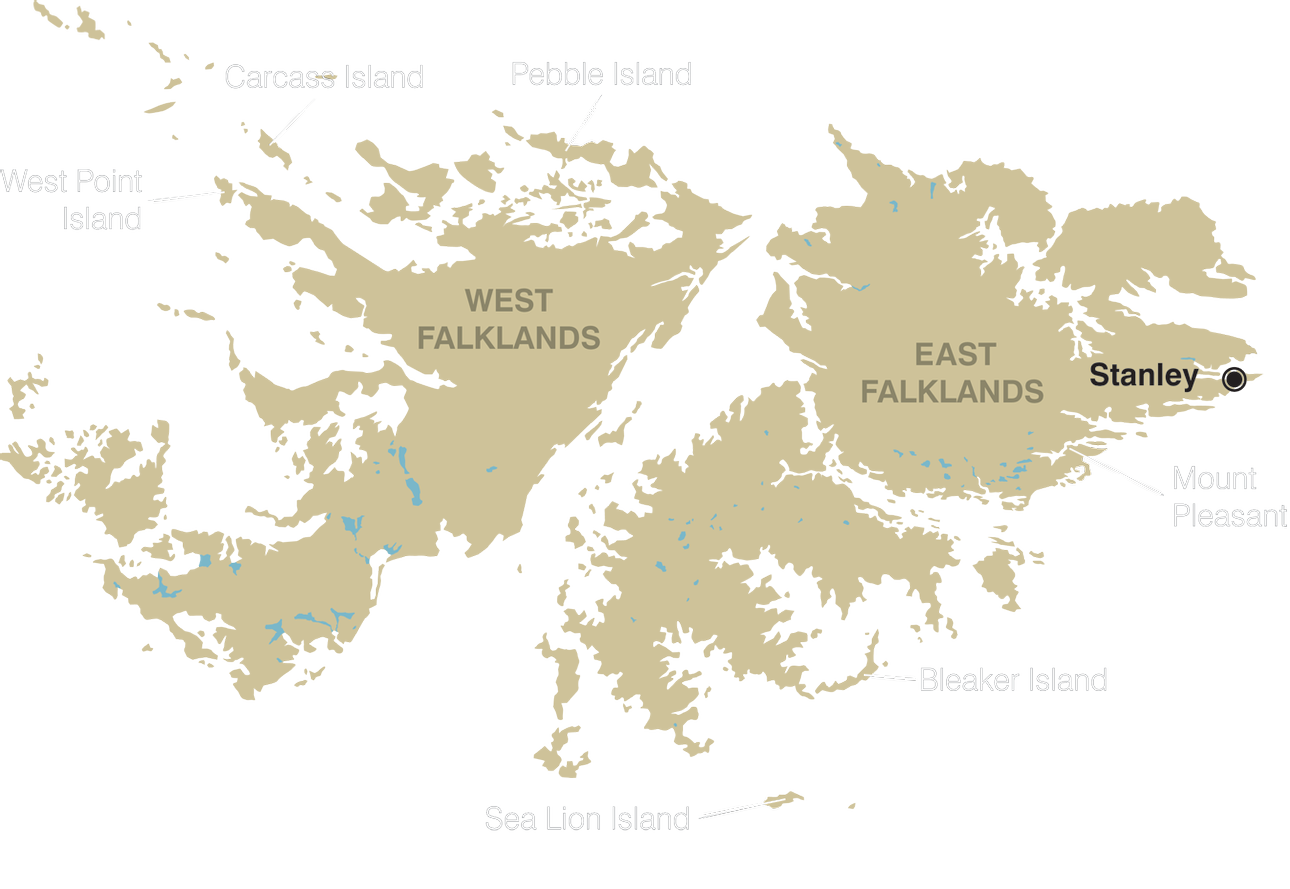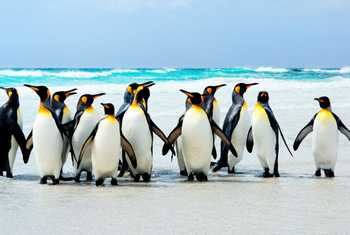


Location Highlights
- Stanley - the capital of the Falkland Islands and near to the largest colony of breeding King Penguins on the islands, at Volunteer Point
- Sea Lion Island - marvel at the resident colony of Killer Whales and the incredibly diverse range of breeding birds
- Carcass & West Point - a wonderful island free from rats and cats, home to large colonies of Magellanic Gentoo Penguins, with thousands of Southern Rockhopper Penguins and Black-browed Albatrosses resident on the nearby West Point Island
- Bleaker Island - an ideal location for walks along long, sandy beaches in search of an exciting array of avifauna
- Pebble Island - home to some 48 species of breeding bird and eight of the Falkland Islands' endemic plants


Tailormade Falkland Islands
Tailormade | Tour Code: TFLKCreate your own Tailormade holiday to the Falkland Islands with dates and an itinerary to suit you.
When to Visit
| J | F | M | A | M | J | J | A | S | O | N | D |
| YY | YY | Y | - | - | - | - | - | - | Y | YY | YY |
SAMPLE HOLIDAY: Falklands Highlights
15 days from £8,795 (Flight Inclusive)
A wonderful itinerary featuring a selection of some of the most picturesque and wildlife-rich islands that make up the Falklands archipelago.
Location Highlights
- Stanley - the capital of the Falkland Islands and near to the largest colony of breeding King Penguins on the islands, at Volunteer Point
- Sea Lion Island - marvel at the resident colony of Killer Whales and the incredibly diverse range of breeding birds
- Carcass & West Point - a wonderful island free from rats and cats, home to large colonies of Magellanic Gentoo Penguins, with thousands of Southern Rockhopper Penguins and Black-browed Albatrosses resident on the nearby West Point Island
- Bleaker Island - an ideal location for walks along long, sandy beaches in search of an exciting array of avifauna
- Pebble Island - home to some 48 species of breeding bird and eight of the Falkland Islands' endemic plants


Quick Enquiry
Summary
Beautifully remote and with a tantalising array of inquisitive wildlife, the Falkland Islands archipelago offers the visiting naturalist the opportunity to enjoy a fabulous variety of wildlife in a curiously familiar setting.
Located only 1,400 kilometres north of the Antarctic Circle, the Falkland Islands is an archipelago of over 700 islands. Sitting amidst some of the most productive fishing waters in the world, the islands provide refuge for a huge number of seabirds and marine mammals, particularly in the breeding season, which extends from October to March. Here, one can find up to five different species of penguins (King, Gentoo, Southern Rockhopper, Macaroni and Magellanic), often numbering in their thousands, whilst the rugged cliff ledges attract large colonies of seabirds that include Imperial and Rock Shags, Black-browed Albatross and the bizarre-looking Pale-faced Sheathbill.
In addition to the fabulous birdlife, the Falklands are home to numerous marine mammals, with breeding colonies of Southern Sea Lions, South American Fur Seals and enormous Southern Elephant Seals found across the various islands. Over a dozen species of cetacean have been recorded in the area, including several pods of Killer Whales which patrol the coastline, preying on penguins and seals. Some Killer Whale individuals have learnt to hunt and specialise in Elephant Seal pups, carefully manoeuvring themselves into the shallow rock pools favoured by the pups, before snatching an unsuspecting young seal and retreating to the depths.
Our Destinations

The capital of the Falklands, Stanley, is situated in the north-east of East Falkland and, with a population of just over 2,000, it is widely cited as the smallest capital in the world. It is a pleasant place to spend a couple of days, with some good restaurants and an excellent museum, but it also provides access to some important sites in the surrounding area. Of most significance is Volunteer Point, which is home to the largest breeding colony of King Penguins on the islands.

Sea Lion Island is the most southerly inhabited island of the Falklands. Measuring only 5 miles long and just over a mile wide, it is possible to explore the whole island on foot. With large stands of tussock grass and a rat-free environment, the island is home to 47 species of breeding birds, including five species of penguin and the endemic Cobb’s Wren. The island also boasts the largest population of Southern Elephant Seals in the Falklands (up to 1,800), a small colony of Southern Sea Lions and a resident pod of Killer Whales.

Situated toward the south-east of East Falkland, Bleaker Island hosts a small working sheep farm. The island itself is roughly 12 miles long, 1 mile wide at its widest, and fairly flat, making it an ideal location for visitors looking for easy walks along the long sandy beaches. The island is home to a large colony of Southern Rockhoppers, with over 750 pairs, along with colonies of Magellanic Penguins and 1,300 breeding pairs of Gentoo Penguins. Long sweeping bays, areas of tussock grass and ponds provide superb habitat for many other bird species, including both White-tufted and Silvery Grebes and Black-necked Swan. An impressive colony of over 4,000 pairs of Imperial Shag is within a few minutes’ walk of the well-kept settlement and your accommodation.

Named after the unusual and attractive pebbles found on the beaches, this 40-kilometre-long island is the third largest in the archipelago. Sandy beaches, moorland and rocky peaks, extensive ponds and wetlands are home to some 42 breeding bird species including over 1,000 pairs of Imperial Shag, plus Gentoo, Magellanic and Southern Rockhopper Penguins. Eight of the Falkland Islands’ endemic plants grow on the island including the Vanilla Daisy and the Lady’s Slipper. Off-road tours offer the chance to visit both the eastern and western end of the islands, both offering an array of wildlife and historic sites.

In over 100 years of habitation, Carcass Island, named after HMS Carcass, has had three environmentally conscious owners who have avoided the introduction of rats and cats; this care, and the freedom from predation, has helped to preserve the island’s rich natural heritage. The island hosts large colonies of Magellanic and Gentoo Penguins, a small number of Southern Elephant Seals, and a variety of sought-after landbirds such as Tussock-bird, Long-tailed Meadowlark and Striated Caracara. One can also take a boat trip from Carcass Island to West Point Island, where thousands of Southern Rockhopper Penguins and Black-browed Albatrosses can be found nesting on the cliffs.
Sample Itineraries
A wonderful itinerary featuring a selection of some of the most picturesque and wildlife-rich islands that make up the Falklands archipelago.

Extend your holiday:
The possibilities for longer holidays in the Falkland Islands are extremely numerous as there are so many islands worthy of exploration. Our experts are here to discuss these options and more, but we have included one suggestion below - to Weddel and Saunders Islands.
Day 14/16 – Weddel Island
Day 17/18 – Saunders Island
Day 19 – Depart Mount Pleasant
Day 20 – Arrive UK
The Essentials
- Wildlife Guides: The respective lodges on each island usually have their own expert guides who typically show you around the island. The charm of the Falklands is that once you’ve been given an overview of the key areas, you are then left to explore at your own pace.
- When to Visit: The best time to visit is during the southern summer, from October to March, when most of the birds and mammals will be breeding.
J F M A M J J A S O N D YY YY Y - - - - - - Y YY YY - Getting Around: The road network on the islands is limited and many excursions are undertaken in 4WD vehicles. For longer distances and transfers to the outer islands, the use of aircraft is required and this is provided by the Falkland Islands’ Government Air Service (FIGAS). There are no fixed schedules and flights are arranged on a day-to-day shuttle basis, subject to demand, and operated to all accessible parts of the islands.
Why Naturetrek Tailormade?
'A Naturetrek Tailormade holiday allows you, with the benefit of our wildlife travel expertise and destination experience, to enjoy the perfect private wildlife holiday – one that truly matches your requirements, expectations and ambitions. We will ensure the most competitive prices, superb naturalist guides and seamless ground services.
Some of the benefits of Naturetrek Tailormade travel include:
• A bespoke itinerary which is crafted by experts and designed specifically for you
• Private guiding by the very best local naturalists
• Travel with people you know, at your own pace
• Incorporate as much culture, history or relaxation time as you wish
• Choose dates to suit you
• Select your preferred style of accommodation
• Travel with families and children of any age
Furthermore, our Tailormade team are always on hand to help and guide you along the way, with friendly advice, first-hand knowledge and inside information specific to your destination of choice. So if you have any queries about your holiday, we will be delighted to answer them. Please just give us a call!'

Similar Trips
Tailormade Holidays in Ecuador & Galápagos TAILORMADE | TOUR CODE : TECU
- Jan
- Feb
- Mar
- Apr
- May
- Jun
- Jul
- Aug
- Sep
- Oct
- Nov
- Dec
Tailormade Argentina TAILORMADE | TOUR CODE : TARG
- Jan
- Feb
- Mar
- Apr
- May
- Jun
- Jul
- Aug
- Sep
- Oct
- Nov
- Dec
Tailormade Holidays in Chile TAILORMADE | TOUR CODE : TCHL
- Jan
- Feb
- Mar
- Apr
- May
- Jun
- Jul
- Aug
- Sep
- Oct
- Nov
- Dec



 Loading search...
Loading search...






























